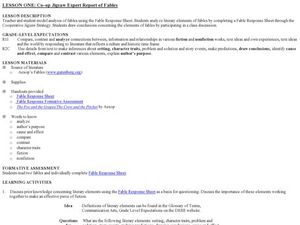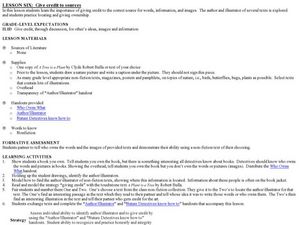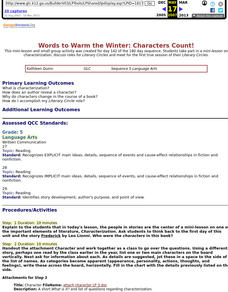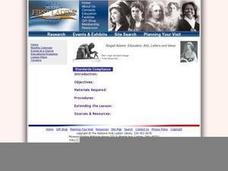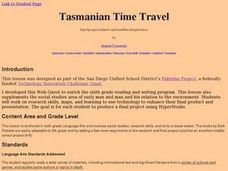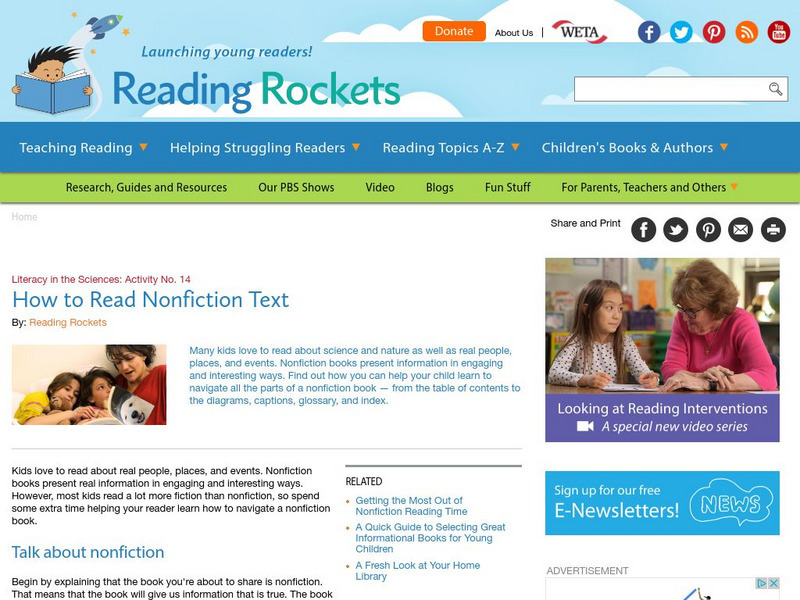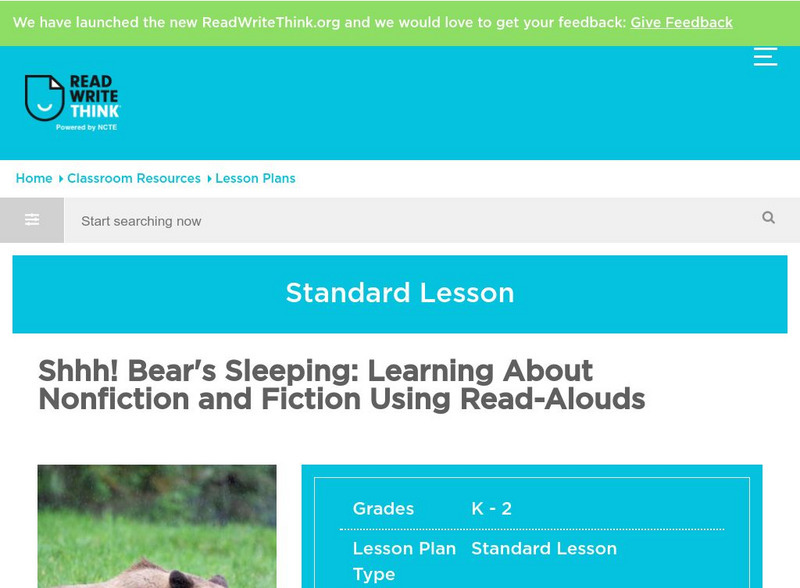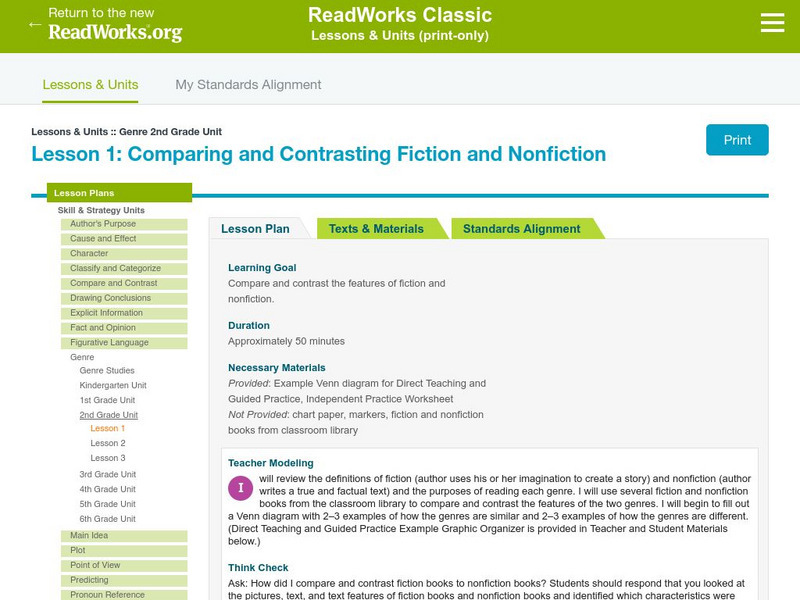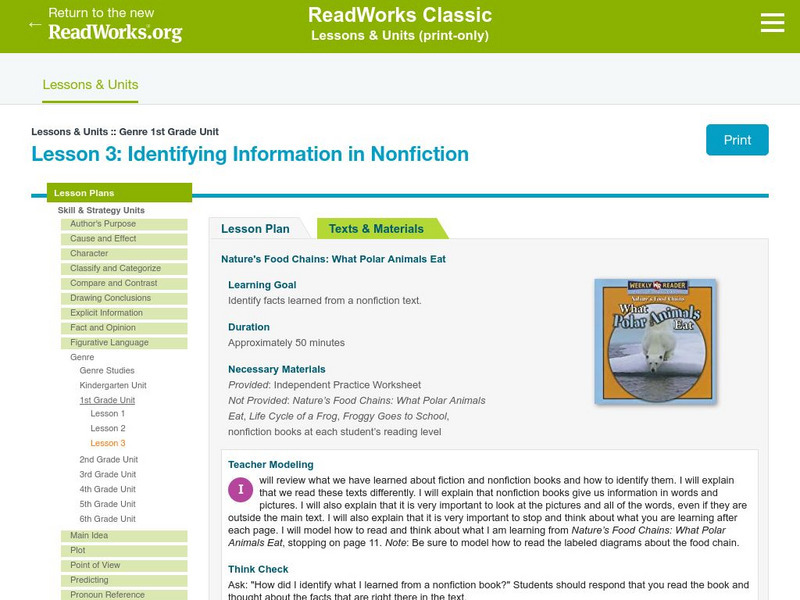Curated OER
Men and Women of the Revolution Interview Sheet- Magic Tree House Series
In this men and women of the American Revolution interview worksheet, students work with a partner to prepare five questions that will be used for mock interviews. They write the questions, and discuss possible answers before recording...
Curated OER
Greek mythology (characteristics and features)
Students recognize the features and characteristics of myths, the role myths played in Greek culture, and choose a writing project. In this Greek mythology lesson, students are introduced to Greek mythology and work in cooperative...
Curated OER
Cooperative Jigsaw Expert Report of Fables
Young scholars research literary elements of fables. In this literature lesson, students analyze literary elements of fables. Young scholars work collaboratively using a jigsaw strategy to analyze literary elements.
Curated OER
Alliteration
In this alliteration worksheet, 4th graders write alliterations with their first names, find rhyming patterns in poems, and more. Students complete 4 activities.
Curated OER
Give Credit to Sources
Third graders practice referencing material. In this giving credit to sources instructional activity, 3rd graders explore ownership of words and images by drawing and labeling a picture then problem solving how to identify the author.
Curated OER
Words to Warm the Winter: Characters Count!
Fifth graders take part in a mini-lesson on characterization, discuss roles for Literary Circles and meet for the first true session of their Literary Circles.
Curated OER
Identify Virginia Native Animals
Students practice using an online encyclopedia to research native animals to Virginia. Using the information from the encyclopedia, they identify the main and supporting ideas. They share their information with the class using the...
Curated OER
Freckle Juice
Working in groups of four, the students will use the computer to draw an imaginary potion that will cure other children their age from physical traits (they can not control) including all ingredients and one text box.
Curated OER
A View of Yourself Through Famous Writers
Learners research famous quotes and discover one that describes themselves. They consider topics such as family and hobbies that will help others understand them. They present their information to the class.
Curated OER
Teaching Language Arts in Kindergarten Using Stories, Aesop's Fables, and Tall Tales
Students search into a variety of story elements in the eight lessons of this unit. The title, author, illustrator, setting, main character, problem, solution, events and the story are the components of the lessons.
Curated OER
Make Way for Ducklings
First graders use skills to collect, organize, and interpret data. They compare and contrast two stories, Make Way for Ducklings and Chibi: A True Story From Japan. Students create a duckling.
Curated OER
Hank Williams: My Inspiration
Students research information about Hank Williams using the internet. Using the lyrics from his songs, they interpret the poetry used. They work together and individually to write their own poems and interpret them.
National First Ladies' Library
Jefferson's Legacy: A National Library
Students examine the creation of the Library of Congress. They investigate reasons why Thomas Jefferson sold his personal collection to the Library. Employing various research resources, students write newspaper articles about the sale...
Curated OER
Tasmanian Time Travel
Sixth graders perform research using the Internet about the Tasmanian Devil. The project can be presented in a variety of ways. The use of computer software is important for students to know, specifically Hyperstudio.
Curated OER
Journal of Children of the World
Students explore the lives of other children. For this comparing and contrasting lesson, students complete a KWL chart on children around the world and use the Internet to compare and contrast these children using different categories....
Reading Rockets
Reading Rockets: How to Read Nonfiction Text
Kids love to read about real people, places, and events. Nonfiction books present real information in engaging and interesting ways. However, most kids read a lot more fiction than nonfiction, so spend some extra time helping your reader...
Reading Rockets
Reading Rockets: 103 Things to Do Before/during/after Reading
The highly-respected Reading Rockets program offers both teachers and students a toolkit of ways to connect more actively with the materials they read. Some of these techniques are specifically for fiction-reading, others are designed...
Reading Rockets
Reading Rockets: Stem Literacy
Learn about how to strengthen literacy, inquiry, and problem-solving skills, and how to connect kids with high-quality nonfiction and informational books. Provides videos, articles for parents and for teachers, webcasts for teachers, and...
Scholastic
Scholastic: Investigating Nonfiction Part 3: Independent and Guided Reading
This article provides tips for using nonfiction with guided reading and independent reading. The following strategies are shared: ways to help kids select "just right" nonfiction books; lessons to use with nonfiction in guided reading...
CommonLit
Common Lit: Book Pairings: "When I Was a Puerto Rican" by Esmeralda Santiago
Selected (7) reading passages (grades 6-8) to pair with the nonfiction book "When I Was a Puerto Rican" by Esmeralda Santiago. Esmeralda Santiago, also known as Negi, describes her childhood growing up in Puerto Rico and her eventual...
Other
Literature Circles: Lesson Plans and More
What are the major roles in literature circles? Check out this site to learn more about the individual roles needed to form a literature circle. Includes links to various reading handouts and lessons.
ReadWriteThink
Read Write Think: Shhh! Bear's Sleeping: Learning About Nonfiction and Fiction
Students explore the distinction between the fiction story Bear Snores On and the nonfiction book Every Autumn Comes the Bear.
Read Works
Read Works: 2nd Grade Lesson: Compare/contrast Genres
[Free Registration/Login Required] A lesson in which students use fiction and nonfiction books from a classroom library to identify the similarities and differences between fiction and nonfiction and to create a Venn diagram...
Read Works
Read Works: Genre 1st Grade Unit: Identifying Information in Nonfiction
[Free Registration/Login Required] A instructional activity in which students use the books Nature's Food Chains: What Polar Animals Eat by Joanne Mattern, Life Cycle of a Frog by Angela Royston, and Froggy Goes to School by Jonathan...




